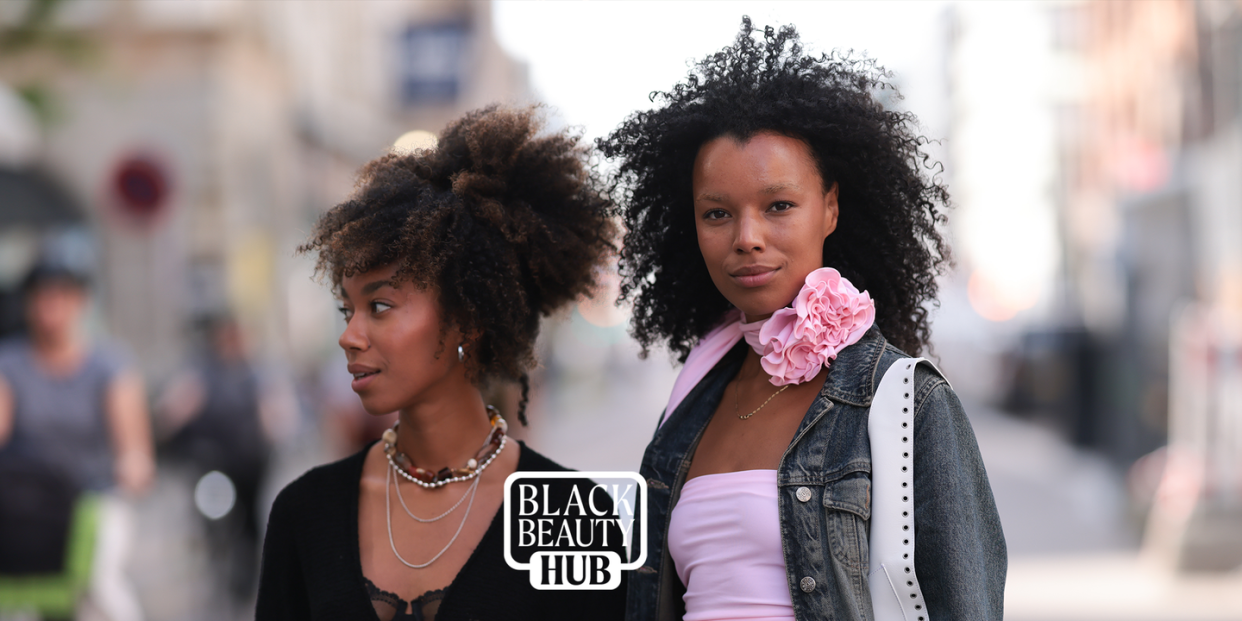These are seven ingredients I never use on my Afro hair

I’m SO precious with what I put on my hair, although recently have come to realise that it’s not necessarily because it’s my pride and joy. Sure, I love it as much as you can love dead protein I suppose, but ultimately I wash it so infrequently that I cannot risk to put a dud product in my hair.
The thing is, Afro hair can be fussy AF. If you use the wrong products then it’ll frizz, kink and in the worst case, break and shed. It's because of this fragile texture that you have to be suuuper careful with the ingredients that you are exposing your ‘fro to.
Believe me, I’ve learnt the hard way - if you scroll far enough through my Instagram feed you can see the damage for yourself... So, I spoke with Dr Ali N. Syed the master chemist, president and founder of Avlon Industries about what ingredients you may want to avoid to keep your Afro hair healthy.
Everyone's hair is different, with different needs and different vulnerabilities, plus our understanding of what's 'good' or 'bad' often evolves. So, we're not saying you have to throw out your favourites if they contain one drop of any of these. But if you are looking to make healthier choices for your hair, looking for products without these ingredients is a good aid to your decision-making.
1. Sulphates
Would you wash your face with hand soap? Would you wash your body with detergent? No, ok great! You’re a sensible person. Did you know the same logic applies to products with sulphates and your fragile textured hair?
“Sulfated detergents such as Sodium Lauryl Sulfate, Ammonium Lauryl Sulfate, and TEA Lauryl Sulfate can be drying for hair and skin,” says Dr Syed. “Our research shows that African-descent hair has approximately 18 to 20% less moisture than Caucasian hair, making it even more crucial to choose a non-drying cleanser.” Stick to cleansing conditioners (there are ones that foam too) for a moisturising clean, with regular clarifying washes for deep cleans when needed to prevent build-up.
2. Drying alcohols
Alcohol: great for parties, bad for party hair. But the problem is that alcohol is found in loads of finishing products, which makes finding a suitable one to set your look a bit of a nightmare. “Certain alcohols such as Ethanol and Isopropanol are also undesirable for Afro hair, because they tend to decrease the natural moisture of the hair and scalp, leaving both dry and brittle,” warns Dr Syed. There are finishing products out there that will hold your style with low alcohol formula.
3. Petro-chemicals
Petro-chemicals are a bit of a weird one aren’t they? We accept that it’s what fuels our cars whilst also slathering something called 'petroleum jelly' on our lips freely. So what’s the deal with these chemicals and our curls?
“Petroleum-derived ingredients such as petrolatum and mineral oil have received a lot of negative attention in the past years,” explains Dr Syed. “This perception was born from the fact that petro-derived ingredients contain certain impurities that may have negative health effects. More specifically, there may be residual polycyclic aromatic hydrocarbons (PAHs) present in petrolatum and mineral oil, which have negative impacts on health and the environment too.”
To avoid petro-chemicals you can look out for products with coconut oil or olive oil which give the same shiny result and aren’t bad for your hair or the environment.
4. Parabens
PARABENS! ‘We are free from Parabens’ screams almost every product on the shelves in the hair and beauty aisles – but what are they? “Ingredients such as Methylparaben, Propylparaben, and Ethylparaben have long been used as preservatives in cosmetic products, but lately their safety was questioned in terms of carcinogenicity and as endocrine disruptors,” says Dr Syed.
Parabens are easily absorbed through the scalp and some have been found to mimic estrogen in your system. Not good. The EU has already put loads of restrictions on parabens in beauty products, so you can feel assured picking up one of those products that are free from these nasties.
5. Phthalates
This is another group of chemicals that when applied, can be absorbed by your system and potentially cause harm. “In haircare, Dihydrogenated Tallow Phthalic Acid has been used in shampoos and body washes as a suspending agent,” says Dr Syed. Despite the fact that this group of ingredients haven’t been banned, many brands have removed them from their formulas. However, just to be sure to check the back of your hairspray as Dimethylphthalate (DMP) is sometimes used to create a flexible hold.
6. Unsafe preservatives
Preservatives are used to literally preserve the shelf life of products, keeping away the growth of bacteria, yeast and mould. So they are necessary in certain forms, but as you can imagine, chemicals that can keep products fresh for 6 to 12 months are pretty potent and can cause itching and rashes on contact with skin via the hair.
Dr Syed highlights Methylisothiazolinone as a preservative to be cautious of. “This is a preservative that is often found in hair care products such as shampoos, conditioners, body washes, cosmetics, sunscreens and moisturising creams.”
7. Fragrance
You know when you see something is fragrance-free and you think ‘booooring’? Your hair thinks please drench me with that. You see, fragrances often contain allergens and endocrine disruptors. Bad for the hair and scalp as they can lead to dryness and itching. It's not an absolute no-no but just one to be aware of.
Remember, the higher up the ingredient, the more present it is in the formula so if you still want your hair to smell like rich lady hair, then just pick a product where the fragrance is listed as one of the last ingredients to ensure minimal damage.
You Might Also Like

 Yahoo Lifestyle
Yahoo Lifestyle 
